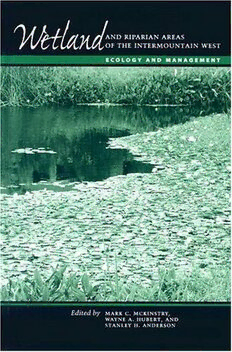Download Wetland and Riparian Areas of the Intermountain West: Ecology and Management PDF Free - Full Version
Download Wetland and Riparian Areas of the Intermountain West: Ecology and Management by Mark C. McKinstry, Wayne A. Hubert, Stanley H. Anderson in PDF format completely FREE. No registration required, no payment needed. Get instant access to this valuable resource on PDFdrive.to!
About Wetland and Riparian Areas of the Intermountain West: Ecology and Management
Wetlands and riparian areas between the Rocky Mountains and the Sierra Nevada are incredibly diverse and valuable habitats. More than 80 percent of the wildlife species in this intermountain region depend on these wetlands--which account for less than 2 percent of the land area--for their survival. At the same time, the wetlands also serve the water needs of ranchers and farmers, recreationists, vacation communities, and cities. It is no exaggeration to call water the ''liquid gold'' of the West, and the burgeoning human demands on this scarce resource make it imperative to understand and properly manage the wetlands and riverine areas of the Intermountain West. This book offers land managers, biologists, and research scientists a state-of-the-art survey of the ecology and management practices of wetland and riparian areas in the Intermountain West. Twelve articles examine such diverse issues as laws and regulations affecting these habitats, the unique physiographic features of the region, the importance of wetlands and riparian areas to fish, wildlife, and livestock, the ecological function of these areas, their value to humans, and the methods to evaluate these habitats. The authors also address the human impacts on the land from urban and suburban development, mining, grazing, energy extraction, recreation, water diversions, and timber harvesting and suggest ways to mitigate such impacts. In addition to the editors, the contributors to this volume are: Paul Adamus, Oregon State University, Corvallis Michael A. Bozek, University of Wisconsin, Stevens Point Robert C. Ehrhart, Oregon State University, Bend James H. Gammonley, Colorado Division of Wildlife, Fort Collins Paul L. Hansen, Bitterroot Restoration, Corvallis, Montana E. Andrew Hart, University of Wyoming, Laramie Murray K. Laubhan, U.S. Geological Survey, Fort Collins, Colorado Kirk Lohman, University of Idaho, Moscow James R. Lovvorn, University of Wyoming, Laramie Neal D. Niemuth, University of Wisconsin, Stevens Point Richard A. Olson, University of Wyoming, Laramie Neil F. Payne, University of Wisconsin, Stevens Point Mark A. Rumble, U.S. Department of Agriculture, Forest Service, Rocky Mountain Research Station, Rapid City, South Dakota Maureen Ryan, University of Toledo (Ohio) College of Law Brian E. Smith, U.S. Geological Survey, Northern Prairie Wildlife Research Center, Jamestown, North Dakota Mark Squillace, University of Toledo (Ohio) College of Law Stephen A. Tessmann, Wyoming Game and Fish Department, Cheyenne David W. Willis, South Dakota State University, Brookings
Detailed Information
| Author: | Mark C. McKinstry, Wayne A. Hubert, Stanley H. Anderson |
|---|---|
| Publication Year: | 2004 |
| ISBN: | 9780292798434 |
| Pages: | 337 |
| Language: | English |
| File Size: | 1.875 |
| Format: | |
| Price: | FREE |
Safe & Secure Download - No registration required
Why Choose PDFdrive for Your Free Wetland and Riparian Areas of the Intermountain West: Ecology and Management Download?
- 100% Free: No hidden fees or subscriptions required for one book every day.
- No Registration: Immediate access is available without creating accounts for one book every day.
- Safe and Secure: Clean downloads without malware or viruses
- Multiple Formats: PDF, MOBI, Mpub,... optimized for all devices
- Educational Resource: Supporting knowledge sharing and learning
Frequently Asked Questions
Is it really free to download Wetland and Riparian Areas of the Intermountain West: Ecology and Management PDF?
Yes, on https://PDFdrive.to you can download Wetland and Riparian Areas of the Intermountain West: Ecology and Management by Mark C. McKinstry, Wayne A. Hubert, Stanley H. Anderson completely free. We don't require any payment, subscription, or registration to access this PDF file. For 3 books every day.
How can I read Wetland and Riparian Areas of the Intermountain West: Ecology and Management on my mobile device?
After downloading Wetland and Riparian Areas of the Intermountain West: Ecology and Management PDF, you can open it with any PDF reader app on your phone or tablet. We recommend using Adobe Acrobat Reader, Apple Books, or Google Play Books for the best reading experience.
Is this the full version of Wetland and Riparian Areas of the Intermountain West: Ecology and Management?
Yes, this is the complete PDF version of Wetland and Riparian Areas of the Intermountain West: Ecology and Management by Mark C. McKinstry, Wayne A. Hubert, Stanley H. Anderson. You will be able to read the entire content as in the printed version without missing any pages.
Is it legal to download Wetland and Riparian Areas of the Intermountain West: Ecology and Management PDF for free?
https://PDFdrive.to provides links to free educational resources available online. We do not store any files on our servers. Please be aware of copyright laws in your country before downloading.
The materials shared are intended for research, educational, and personal use in accordance with fair use principles.

